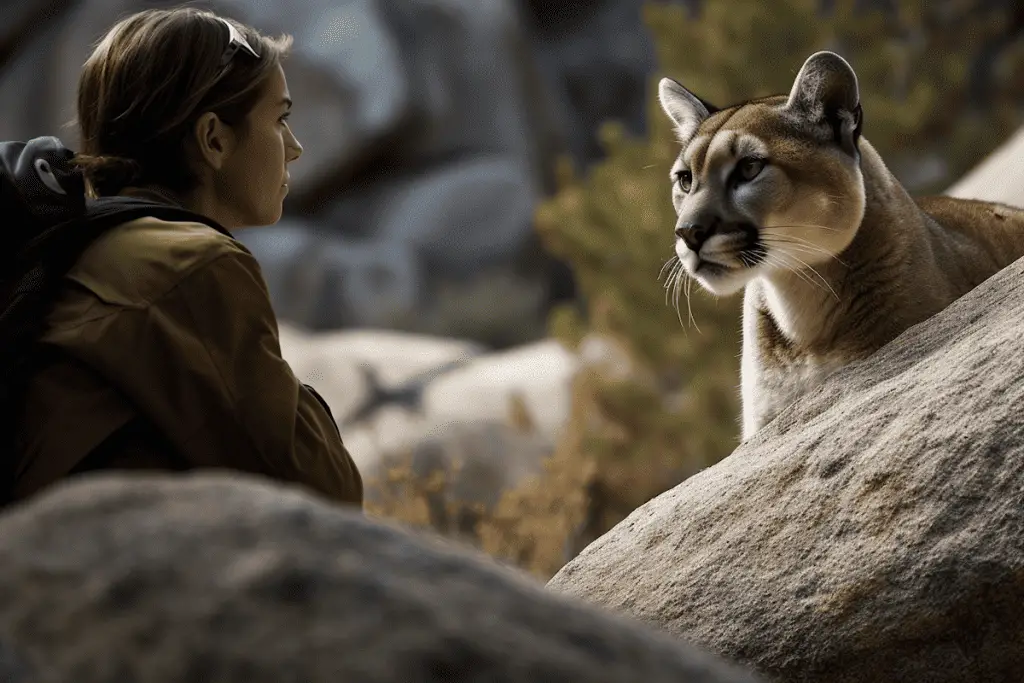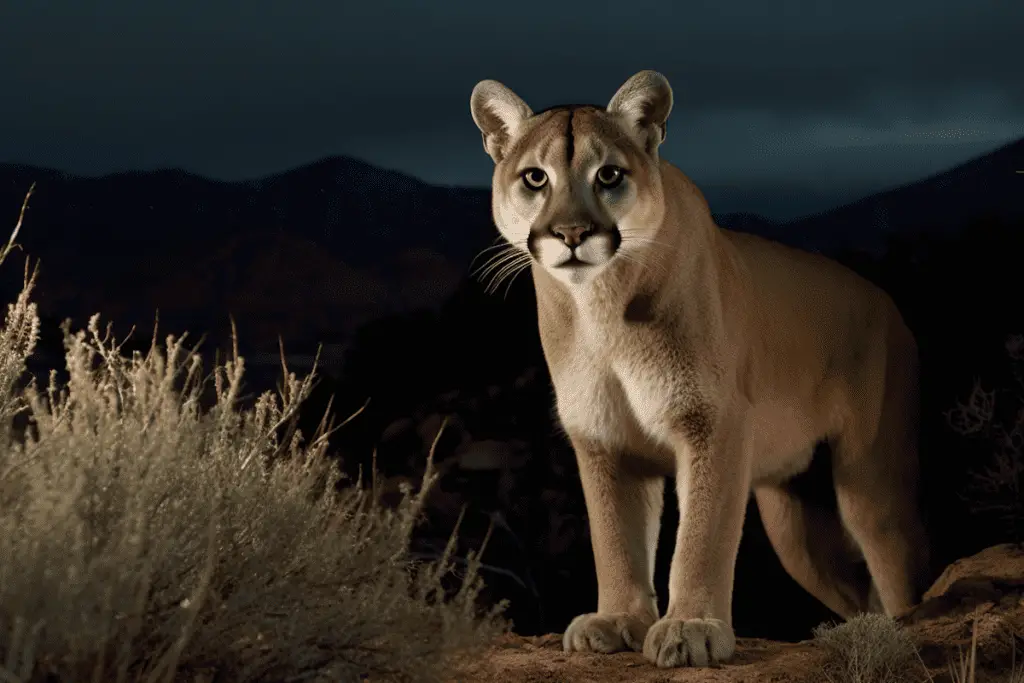We know that bear spray can offer some protection against bears but does bear spray work on mountain lions?
Yes, bear spray can be effective against mountain lions. However, it is important to note that bear spray is not a guaranteed defense against mountain lions and should not be relied upon as the sole means of protection. It is always best to take precautions and avoid encounters with wildlife whenever possible.

The Threat of Mountain Lions
When we step into the great outdoors, we’re stepping into the home of a myriad of creatures, some more intimidating than others. Mountain lions, also known as cougars, pumas, or catamounts, are one such creature that can make us feel like we’ve ventured a little too far from our comfort zone. Powerful and elusive, these large cats roam vast territories in mountainous regions and can pose a threat, albeit a rare one, to hikers and outdoor enthusiasts.
Want to know where you can find mountain lions? Check out our post on camping and hiking with mountain lions.
That said, it’s important to keep in mind that mountain lions, like most wildlife, prefer to avoid humans. Most of the time, they see us before we see them and they’d rather steer clear. But, just like the weather, wildlife behavior can be unpredictable. So, as much as we love the thrill of outdoor adventures, it’s crucial we’re prepared for all eventualities, including potential encounters with these majestic animals.
While mountain lion attacks on humans are extremely rare, they can and do happen. When they do, they make headlines. For us outdoor lovers, the question isn’t whether we should stop exploring nature – that’s non-negotiable. The question is: how do we continue to enjoy our wilderness adventures while staying safe from possible mountain lion encounters?
Understanding Bear Spray: Its Ingredients and Mechanism
Bear spray might sound like a magic potion we pull out when we encounter a bear or other large wildlife. But the truth is, it’s not magic – it’s science. Bear spray is an aerosol canister filled with a derivative of hot peppers called capsaicin and related capsaicinoids. You might recognize capsaicin as the very thing that sets your mouth on fire when you bite into a chili pepper. Well, imagine that sensation, but in your eyes, nose, and lungs – not pleasant, right? That’s exactly the point.
So, how does it work? When you spray, it creates a cloud of capsaicinoids, which, if inhaled or contacted by an animal, cause intense burning and discomfort, particularly in the eyes and respiratory system. The goal isn’t to harm the animal, but rather to overwhelm its senses temporarily, creating a window of opportunity for you to escape.
Bear spray has been extensively tested and proven effective against bears. It’s actually more effective at deterring bear attacks than firearms, without causing any long-term harm to the bear. But the big question for us today is, does it work as well on mountain lions as it does on bears?
Bear Spray Versus Mountain Lions: Does it Really Work?
So, we’ve learned what bear spray is and how it works, and now we’re scratching our heads, wondering, “Does this stuff actually work on mountain lions?” Good news – it does! Despite its name, bear spray isn’t just for bears. It works as a deterrent for many types of large wildlife that might pose a threat, and yes, that includes our feline friends, the mountain lions.
The reason bear spray works on mountain lions is the same reason it works on bears – capsaicin. When sprayed, this hot pepper extract creates an intense burning sensation in the eyes and respiratory system of the animal, causing it to become disoriented and retreat. It’s not a pleasant experience for the animal, but it doesn’t cause any permanent harm, making it an ethical choice for wildlife deterrence.
How to Use Bear Spray Correctly: Essential Tips for Hikers
Having bear spray is one thing, but knowing how to use it is another. Think of it like a fire extinguisher – it’s not much use if you don’t know how to operate it in an emergency, right? The same principle applies to bear spray.
First things first, always keep your bear spray easily accessible. That means, not in your backpack, but somewhere you can reach immediately like a belt holster or in an exterior pouch of your pack. The reason? Encounters with mountain lions, or any wildlife, can happen without warning. You won’t have time to rummage through your bag when you need it.
Now, how to use it: If a mountain lion approaches you, your first instinct might be to spray immediately. But hold on, timing is crucial here. Bear spray is most effective when the lion is about 30 to 60 feet away. Too far and the spray might not reach; too close, and it could be too late.
Once you’re ready to spray, aim slightly down and adjust for any wind to create a barrier between you and the approaching animal. Spray in short bursts to conserve the spray and only use the entire canister if the lion continues to approach.
Alternatives to Bear Spray: Other Deterrent Methods for Mountain Lions
So, we’ve talked quite a bit about bear spray, but let’s not forget it’s not the only tool in our hiker’s toolbox. There are other methods to deter mountain lions, and understanding these alternatives can equip you with a more well-rounded approach to your safety.
First up, let’s talk prevention. The best way to deter a mountain lion is to avoid an encounter altogether. Make noise while you hike, especially in dense vegetation or near a running stream where the sound of your approach might be muffled. The goal is to let any nearby animals know you’re coming, giving them ample time to steer clear.

Traveling in groups can also deter mountain lions. They are less likely to approach multiple people. If you’re with children, keep them close and within sight at all times.
In case you do encounter a mountain lion, there are several things you can do. Make yourself look bigger by raising your arms and standing on your tiptoes. This might make you seem more formidable to the mountain lion. If the mountain lion behaves aggressively, throw rocks or sticks, but without bending over or turning your back.
Lastly, remember that maintaining eye contact and slowly backing away without turning your back can also be effective. However, never corner a mountain lion or any wild animal – their instinct is to fight their way out.
Remember, each encounter with a mountain lion is unique and these tips are general guidelines, not guaranteed solutions. Always stay alert and aware of your surroundings in mountain lion territory, and respect these majestic animals from a safe distance.
